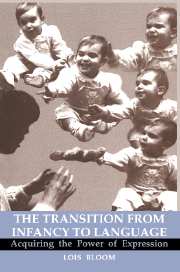
-
Select format
-
- Publisher:
- Cambridge University Press
- Publication date:
- August 2010
- November 1993
- ISBN:
- 9780511752797
- Dimensions:
- Weight & Pages:
- Dimensions:
- Weight & Pages:
- Subjects:
- Developmental Psychology, History, Psychology, Economic History
You may already have access via personal or institutional login- Subjects:
- Developmental Psychology, History, Psychology, Economic History
Book description
In this important volume, Lois Bloom brings together the theoretical and empirical work she has carried out on early lexical development. Its focus is on the expressive power children acquire as they begin to talk and, in particular, on contributions from cognitive development, affect expression, and the social context for making the transition from prelinguistic expression to the expression of contents of mind. The first half of the book reviews the developments in infancy that enable the emergence of language and presents the theoretical perspective required for an understanding of the longitudinal study described in the second half. The book's main thesis is that language is acquired for expressing contents of mind and that its usefulness as a 'tool' is of only secondary importance. The Transition from Infancy to Language makes a major contribution to our knowledge of early lexical development, providing a persuasive theoretical model for researchers and students.
Reviews
"...its thoroughness and its elegant intertwining of empirical results and theoretical arguments make it essential reading for graduate students and faculty in the field of first language acquisition and in any relevant subfields of psychology, philosophy, and education." L. Bebout, Choice
"...proposes an interactive model of language development--interactive in her scheme both because the child's situation in a social context is essential and because language development is essentially related to cognitive and affective capacities....an important step forward in the attempt to account for early word learning from the perspective of real children faced with the task of acquiring and using a language." Marilyn Shatz, Science
"...its thoroughness and its elegant intertwining of empirical results and theoretical arguments make it essential reading for graduate students and faculty in the field of first language acquisition and in any relevant subfields of psychology, philosophy, and education." L. Bebout, Choice
"...the latest contribution from a distinguished scholar." TES
Contents
Metrics
Full text views
Full text views help Loading metrics...
Loading metrics...
* Views captured on Cambridge Core between #date#. This data will be updated every 24 hours.
Usage data cannot currently be displayed.
Accessibility standard: Unknown
Why this information is here
This section outlines the accessibility features of this content - including support for screen readers, full keyboard navigation and high-contrast display options. This may not be relevant for you.
Accessibility Information
Accessibility compliance for the PDF of this book is currently unknown and may be updated in the future.


